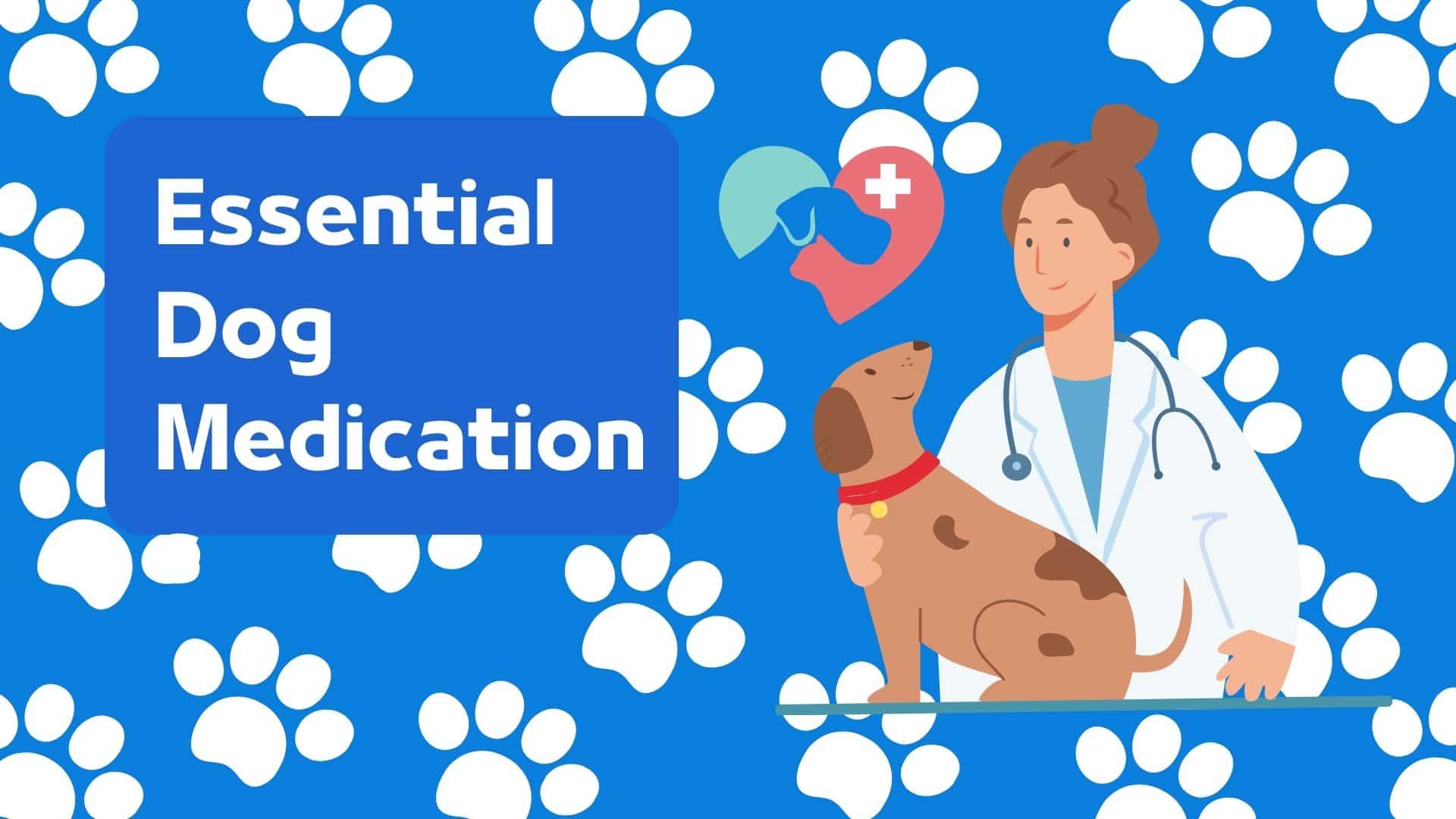There are some essential do medications that pet parents should know about. Dogs quickly become part of the family the minute they are brought home as pets. Their loyalty and high energy make a great addition to the family, not just for adults but also for kids.
However, what happens when your dog falls sick? Like any other creature, dogs, too, can fall ill for different reasons. When this happens, the hyperactivity you are used to, together with the high appetite, can be gone in a whisker. Luckily, there are medications available on the market to help stabilize the health of your dog.
We will mention some prescription drugs used to treat conditions found in dogs, such as allergies, arthritis, anxiety, and infections. Dogs with untreated diseases can develop life-threatening conditions if not properly managed.
Dog Medications Most Pet Parents Need To be Aware Of

Mixing more than one medication can attack your pet’s vital organs and lead to serious health complications. Do not give your dog any over-the-counter medicine before consulting your veterinarian, because they can provide guidance on safe and appropriate medications for your pet.
Deworming medications
Intestinal worms or bacteria can cause various health problems if left untreated. According to the American Heartworm Society, worms can lead to malnutrition, weight loss, and anemia in both humans and animals. Additionally, they can also disrupt the normal functioning of the digestive system and impair nutrient absorption, further compromising overall health.
Fleas and ticks can be treated with Advantage II or other flea and tick medications, which help prevent infestations and reduce the risk of diseases transmitted by these parasites. These medications should be administered regularly according to the instructions provided by a veterinarian or a professional.
Steroids
Pain management in dogs can be effective for reducing inflammation and promoting healing. Prednisone is a commonly prescribed steroid for dogs that can help to alleviate pain and improve their overall quality of life.
Some steroids are also used to suppress the immune system in cases where they are overactive and cause discomfort. However, it is important to note that long-term use of steroids in dogs can have side effects such as increased thirst, weight gain, and weakened immune systems.
Heart medications
Dogs with high blood pressure may need to take heart medications to manage their condition. You should take your pet to the veterinarian’s office to run some blood tests and determine the appropriate heart medications for their specific needs.
Some dog medications can prevent the narrowing of blood vessels and reduce the workload on the heart, while others can help regulate the heart’s rhythm. It is important to follow the veterinarian’s instructions and regularly monitor your dog’s blood pressure to ensure that the medications are effectively managing their condition.
Anxiety dog medicine
Doxepin is regularly prescribed to treat diagnosed anxiety in dogs to help calm their symptoms and improve their overall well-being. Follow the recommended dose and administration instructions provided by the veterinarian to ensure the safety and effectiveness of the medication.
Rabies vaccination
Rabvac is used to prevent rabies in animals. It is a highly effective vaccine that stimulates the immune system to produce antibodies against the rabies virus. Rabvac is administered through a series of injections and provides long-lasting protection against this deadly disease.
Allergy medications
Atopica is a commonly prescribed drug used to reduce inflammation and itching symptoms found in your dog’s skin. It is typically used to treat allergic dermatitis, a condition that causes irritation and discomfort for dogs. Atopica works by suppressing the immune system’s response to allergens, providing relief for your dog’s skin issues.
Lyme disease treatment
Doxycycline is a non-FDA-approved medication used regularly in dogs to treat bacterial infections. For the treatment of human Lyme disease, healthcare professionals frequently prescribe it. Doxycycline works by inhibiting the growth of worm and is particularly effective against the bacteria that cause this disease.
Hydrogen peroxides
Your home first aid kit should always have Hydrogen Peroxide. It is great for cleaning up wounds and cuts on your dog. Further, you can use it to induce vomiting, in the event your dog ingests some toxic food.
Omega 3 supplements
Most people do not appreciate that there are several benefits of fish oil for dogs. For one, fish oils help boost heart and joint health. Further, Omega 3 supplements are fantastic for growing lustrous and healthy hair, while reducing shedding of the coat.
Antibiotics for bacterial infections
There is no better way to prevent infection in a wound than by using an antibiotic. Once you realize your dog has been hurt, an antibiotic ointment prevents further infection of the wound. Besides, this supply is a great resource for temporarily relieving pain from the injury.
Antibiotics can cause diarrhea and upset stomachs as common side effects. It is important to follow the prescribed dosage and duration of the antibiotic treatment to avoid antibiotic resistance.
Human medications
Be careful with some human pain medications because some of them can cause kidney failure and organ damage. Dogs have different metabolisms and sensitivities, and certain medications that are safe for humans may be toxic to dogs.
Humans need to become familiar with some of these dog medications and their potential side effects before administering them to their pets. Some medicines that you can get at the pharmacy can affect dogs differently than humans, and it is crucial to consult a veterinarian before giving any medication to your pet.
Other Things To Have On Hand For Preventive Care

You can find some pill pockets, which are known to be small treats that can help you insert any pill into your pet’s mouth without them noticing. These pill pockets are often soft and malleable, making it easy to hide the pill inside and seal it shut.
No-Chew Bandage
It is not enough to clean up a wound when your dog is hurt. You will need a bandage to cover up the wound before you can seek further medical help. In this case, you will need a no-chew bandage. Usually, dogs will chew off any bandage on them. However, there are bandages made to prevent this. The no-chew bandages have a bitter taste so that dogs are not tempted to chew on them.
Magnifying pet tweezers
A dog is very susceptible to splinters on his paws because he does not wear shoes. Every time your dog is put and about, he might just come home with a splinter, putting him in a lot of discomforts. It can help with post-surgery home treatments for your dog.
For this, having magnifying pet tweezers in your home can save you a lot of hassle. You can quickly get the thorns, or burrs out of him in seconds. This goes for getting rid of a tick or flea on his coat.
Medical paperwork
Before you can determine any medication for your dog, you need to have the relevant paperwork that informs of your dog’s overall health condition. The best place to begin is to have your dog checked by a vet. The medical history of your dog matters, especially in the event of an emergency health situation.
Prevention Tips According To The American Veterinary Medical Association
Can my dog have any adverse reactions to any of these medicines? Running blood work on dogs can lead to potential adverse reactions, such as bleeding or infection at the site of the blood draw.
For the health of your dog, feeding and exercising him is not enough. Consider the above medications and supplies as part of the healthcare for your pet. However, even while most of the medication in this list is helpful, be careful to consult your vet before you procure any treatment for your dog.
Ensure you learn how to use all the medication and supplies beforehand, instead of doing so when there is an emergency. Have your vet check your dog’s body periodically to eliminate any possible cancer or health issues. Regular check-ups can help detect any potential problems early on, increasing the chances of successful treatment and improving your dog’s overall well-being.
Last Updated on 16/03/2025 by Karen Snow
Hi! I’m Karen and a certified dog lover. As a freelance writer and blogger, I do my best to squeeze in some time with my dogs, learning more about the way they act and how I can make sure that they continue to stay well-cared for by yours truly.
My dogs have helped me through a lot, and this is my way of giving back to them! Besides animals, I also love to travel and cook, having explored my country’s restaurants and unique places. Follow me as I show you all the amazing tips and bits of information I learn along the way about our furry friends!
